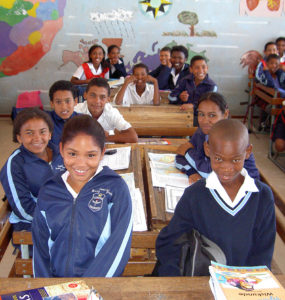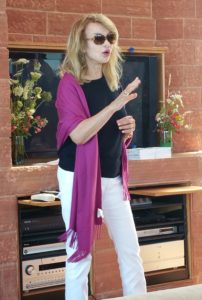The Gates of Damascus
 Someone else’s things are in the house: school notebooks that don’t belong to Asma, a cardboard box of cheap cookies Hala would never buy, a small bottle of Syrian perfume. My cupboard is full of junk, and there’s an unfamiliar dress hanging on the line.
Someone else’s things are in the house: school notebooks that don’t belong to Asma, a cardboard box of cheap cookies Hala would never buy, a small bottle of Syrian perfume. My cupboard is full of junk, and there’s an unfamiliar dress hanging on the line.
Hala comes in around noon, in a hurry, plastic bags full of groceries in both hands. She looks tired – her face is swollen. ‘I thought you’d never come back!’ We hug, clumsily as always.
‘We have guests,’ she says.
‘Yes, I noticed.’
‘Sahar and Aisha, they’re not staying long.’ Sahar is a Christian, I suddenly remember, her husband a Muslim. There you have it – the religious differences everyone has been talking about during the last few days don’t apply to Hala and her friends.
‘Have you heard the news? They say the prisoners are going to be released. Sahar is having her house fixed up; that’s why she’s staying here.’
‘What about Ahmed?’
Hala shrugs. ‘He asked me to bring him his winter clothes. That means he’s planning to stay for a while.’
She begins peeling potatoes in the kitchen; the children will be coming home any minute. I bring in the folding table from the hallway, pull up a plastic chair and apply myself to the green beans. Hala gives me a searching look. ‘How was it? Anything interesting happen?’ She sounds skeptical.
I tell her about Father Léon’s weird cap, the grumbling hikers, the ups and downs of Louise’s love life. I suddenly realize that when I arrived in Syria I didn’t even know whether Hala was a Christian or a Muslim – we didn’t talk about those things back then.
‘Do you consider me a typical Christian? Have you ever thought of me that way?’
Hala laughs in surprise. ‘No, what makes you think that?’
‘Oh, I don’t know, I just wondered.’
Lieve Joris On Congo ~ The Rebels’ Hour In Brief
At a time when UN Peacekeepers are trying hard to maintain peace in the Congo, award winning author and journalist Lieve Joris discusses her work in the region and shares the history of the conflict as seen by a Tutsi rebel leader who eventually became a high-ranking general in the Congolese army. Lieve Joris is one of Europe’s leading travel writers with reporting that has spanned the globe—from Hungary to Africa.
A New Economic System For A World In Rapid Disintegration
 truth-out.org. September 2016. We live in ominously dangerous times. The world capitalist system — having fueled colonialism, imperialism and the constant intensification of labor power exploitation for roughly 500 years — now threatens the planet with an ecological collapse of unprecedented proportions. Unsustainable resource exploitation, water pollution (the transformation of lakes, rivers and oceans into garbage dumps) and massive economic inequality are at the root of the possibly irreversible collapse of industrial civilization. Meanwhile, however, too many of us remain caught up in abstract and ahistorical predictions of collapse that fail to offer an alternative realistic vision of a future socio-economic order.
truth-out.org. September 2016. We live in ominously dangerous times. The world capitalist system — having fueled colonialism, imperialism and the constant intensification of labor power exploitation for roughly 500 years — now threatens the planet with an ecological collapse of unprecedented proportions. Unsustainable resource exploitation, water pollution (the transformation of lakes, rivers and oceans into garbage dumps) and massive economic inequality are at the root of the possibly irreversible collapse of industrial civilization. Meanwhile, however, too many of us remain caught up in abstract and ahistorical predictions of collapse that fail to offer an alternative realistic vision of a future socio-economic order.
Simultaneously, the phenomenon of global warming, driven mainly by the dynamics and contradictions of a fossil-based economy, has prepared the soil for the eruption of new sources of conflict with the manifestation of historically unique destabilizing social forces. Climate change directly threatens billions of people and most other beings — besides the occasional cockroach, diadem or tardigrade — with outright extinction brought on by droughts, floods and other “natural” disasters.
Nonetheless, the catastrophic scenario sketched out behind the operations of global capitalism does not merely represent the other side of a wild socio-economic system bent on constant and abstract growth in pursuit of ever greater rates of profit. The so-called Golden Age of capitalism ended decades ago and the system has now run into a brick wall, as it appears to have reached a point where it is no longer capable of sustaining a constant momentum of growth to keep the economy reproducing itself at a pace that generates higher standards of living for the next generation.
Indeed, the productivity rates in the advanced industrialized regions of the world (such as the US, Europe and Japan) since the eruption of the financial crisis of 2007-08 are far slower than those of previous decades, thereby confirming the claims of various experts who argue that we have reached the end of the age of growth.
Moreover, in spite of all the talk about the marvelous and awe-inspiring accomplishments of the high-tech revolution, these innovations pale in comparison to the innovations of the Industrial Revolution. The new technologies reach billions of people, generating mythical fortunes for founders and investors, but increasingly employ only a handful of privileged workers. In the meantime, the problems of massive unemployment, increased inequality, growing economic insecurity, and dangerous levels of public and corporate debt are mounting.
In this context, the present crisis facing the world economy as a whole “consists precisely in the fact,” as Antonio Gramsci put it in his Prison Notebooks, “that the old is dying and the new cannot be born,” and all of the above represent the “morbid symptoms” of this antinomy that the great Italian revolutionary underscored as being part of this interregnum. Read more
How Schools Use Language As A Way To Exclude Children
Kenyan author Ngũgĩ wa Thiong’o once described language as “the most important vehicle through which that [colonial] power fascinated and held the soul prisoner”.
He illustrated this with a disturbing account of receiving corporal punishment, being fined and wearing a “plate around the neck with inscriptions such as I AM STUPID or I AM A DONKEY”. His “crime”? Speaking Gikuyu at his English medium school.
Today, decisions about which language resources should count in schooling – as the language of instruction, a subject, or a legitimate language for learning – continue to be informed by the relationships between language and power. Schools and universities in post-colonial contexts still operate within the logic of coloniality.
These realities have been thrown into sharp relief by revelations that some South African schools discipline their pupils for speaking any language but English (or Afrikaans) while on school grounds. At Cape Town’s Sans Souci High School for Girls, pupils obtain “losses” (or demerits) for a range of “offences” – like being caught speaking isiXhosa. For many of Sans Souci’s pupils, this is their home language.
Sadly this problem isn’t unique to South Africa. It’s been seen in other post-colonial contexts like Nigeria, Kenya and Zimbabwe. Nigerian novelist Chimamanda Adichie has spoken about not having the opportunity to learn Igbo proficiently at school. This, she says, left her with no option but to write exclusively in English.
These girls’ stories have foregrounded the crucial issue of language in processes of assimilation and exclusion. Over the past ten years there has been a major shift in our understandings of language, bilingualism and bilingual education which show the learning advantages of using more than one language in the classroom for learning. Read more
Avoiding Extinction: The Way Out Of Climate Change
For the first time ever, humans are dominating planet Earth. We are changing the basic metabolism of the planet: the composition of gases in the atmosphere, its bodies of water, and the complex web of species that makes life on Earth. What will come next?
We see that the changes we are precipitating in the atmosphere are fundamental and can lead to disruptions in climate and global warming. Both the North and the South Poles are melting. Water expands when it is heated. Since the seas are warming, sea level is rising all over the world. This irrevocable upward trend is well documented: slowly but surely the rising waters will sink most island states. There are 43 island states in the United Nations representing about 23% of the global vote and most or all could disappear soon under the warming seas.
The current shift in climate patterns threatens many species. It has allowed for the spread of insects that are migrating to areas they did not previously inhabit, bringing with them a variety of vector- borne illnesses. For example, new outbreaks of malaria in Africa are on the rise. Humans are also shifting ground. The UN reports that 21 million people are reportedly migrating due to drought and other climate change induced conditions, and the numbers are increasing rapidly (http://newsroom.unfccc.int/unfccc-newsroom/human-mobility-and-the-paris-agreement/). The 2014 migration of one million people into the EU is causing considerable political stress leading to anti-immigration candidates in German, UK, and US elections, and some anticipate that it could damage the fabric of Western democracy.
In the U.S., the consequences are less extreme but still evident: the mighty Colorado River is drying up, prompting orders to turn off farm water in several states. Lake Meads waters in Nevada are exhibiting record lows, threatening the main supply of water to Las Vegas. Wild fires from drought conditions have multiplied and have spread rapidly around the region and in California since 2006.
The world is aware of the connection that scientists postulate between climate change and the use of fossil energy. The largest segment of carbon emissions, about 45% of the global emissions of CO2, originate in the worlds power plant infrastructure, 87% of which are fossil fuel plants that produce the overwhelming majority of the worlds electricity. This power plant infrastructure represents a value worth $45-55 trillion according to the International Energy Agency (IEA), which is about the scope of the worlds economic output. New forms of clean energy are emerging, such as wind farms in Scotland and solar farms in Spain and the US, in an attempt to forestall carbon emissions. But the process is necessarily slow since the worlds fossil power plant infrastructure is comparable in monetary value to the worlds entire GDP, and changing this infrastructure can take decades. Transforming the power plant infrastructure is too slow to avert the potential catastrophes that are anticipated in the next 1020 years. What is the solution?
Below I propose a realistic plan that involves market solutions in industrial and developing nations which will simultaneously resolve the problems of economic development and climate change and the global climate negotiations. But climate change is just one of several global environmental areas that are in crisis today. Biodiversity is another; industrialization and climate warming threaten the world’s ecosystems. Endangered species include sea-mammals, birds such as cockatoos, polar bears, and marine life such as coral, saw-fish, whales, sharks, dogfish, sea turtles, skates, grouper, seals, rays, bass, elephants, and even primates, our cousins in evolution. Scientists know that we are in the midst of the sixth largest extinction of biodiversity in the history of our planet, and that the scope of extinction is so large that 75% of all known species are at risk today. The UN Millennium Report documents rates of extinction at 1,000 times higher than fossil records. The current extinction event is the largest following the dinosaurs extinction that took place 60 to 65 million years ago. But todays extinction event is unique in that it is caused by human activity. And it puts our own species at risk. There is a warning signal worth bringing up: all major recorded planetary extinctions were related to changes in climate conditions. Through industrialization we have created environmental conditions that could threaten our own species survival. 99.9% of all species that ever existed are now extinct.
Are we next?
Will humans survive?
The issue now is how to avoid extinction. Read more
- Page 3 of 3
- previous page
- 1
- 2
- 3




